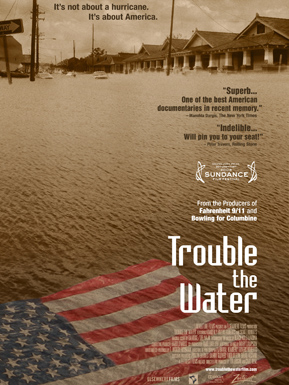Katrina in the House
Oscar-nominated directors of Trouble the Water screen and answer questions tonight

As Hurricane Katrina pummeled New Orleans’ 9th Ward, Kimberly Roberts used a $20 video camera to witness and record the destruction as levees breeched, neighbors drowned, and her home was destroyed.
Back in New York, Tia Lessin and Carl Deal watched the news and felt powerless. But as producers of the Michael Moore films Fahrenheit 9/11 and Bowling for Columbine, they were no strangers to confrontational documentaries. So they gathered donated equipment and headed to New Orleans.
“I’m passionate about human rights, economic rights, the struggle for economic and racial justice,” Lessin says.
The filmmakers used Roberts’ raw 15 minutes, intertwining it with archival news footage and their own material to create Trouble the Water, which follows Roberts and her husband, Scott, on and off for more than two years, first in New Orleans, then through a forced relocation to Memphis, and eventually their return.
As with all good filmmaking, the personal stories came to represent much more, capturing the recovery of the 9th Ward despite the government’s failure to help: the film won the Grand Jury Prize for Best Documentary at the 2008 Sundance Film Festival and was nominated for Best Documentary Feature at the 2008 Academy Awards.
BU Today spoke with Lessin in advance of tonight’s 7 p.m. screening and Q&A with Lessin and Deal at the School of Management, sponsored by BU’s Luce Program in Scripture and Literary Arts.
BU Today: Where did you get the title Trouble the Water?
Lessin: The name comes from the gospel song “Wade in the Water,” which has the lyrics, “Wade in the water, God’s gonna trouble the water.”
Why did you decide to tell this story?
After Katrina we were just outraged at the images we saw. It was similar to our feelings as New Yorkers after 9/11 — we felt compelled to do something. We aren’t nurses, truck drivers, or schoolteachers; we’re filmmakers. We thought we could help make sense of what we were seeing, possibly even assign some accountability. We were motivated by questions: why hasn’t the city been evacuated? Why was help so late in coming?
And then the questions were replaced by inspiration. We found a lot of inspiration in Kimberly and Scott’s journey. They gave us a window in.
How has the experience changed the way you look at our country and our government?
Hurricane Katrina should have put the battle against racism and poverty at the top of the national agenda, but it didn’t. Quite the contrary, the Bush administration brought huge cuts to antipoverty programs and widened the gap between rich and poor, black and white. I certainly was a big critic of the Bush administration, and it made me a bigger critic.
What’s your advice for students who want to be filmmakers?
Be impacted by what’s going on around you, not just what’s in your head. Use the camera to force accountability and open a window to stories that aren’t being told. Use the camera to move audiences.
Trouble the Water will be screened tonight, Tuesday, April 7, at 7 p.m. in the SMG Auditorium, 595 Commonwealth Ave. A Q&A session will follow, moderated by Dale P. Andrews, the Martin Luther King, Jr., Professor of Homiletics and Pastoral Theology in the School of Theology. Cosponsored by the National Endowment for the Humanities Distinguished Teaching Professorship of the Core Curriculum, the Center for Practical Theology, Marsh Chapel, and the School of Theology, the screening is free and open to the public.
Amy Laskowski can be reached at amlaskow@bu.edu.

Comments & Discussion
Boston University moderates comments to facilitate an informed, substantive, civil conversation. Abusive, profane, self-promotional, misleading, incoherent or off-topic comments will be rejected. Moderators are staffed during regular business hours (EST) and can only accept comments written in English. Statistics or facts must include a citation or a link to the citation.